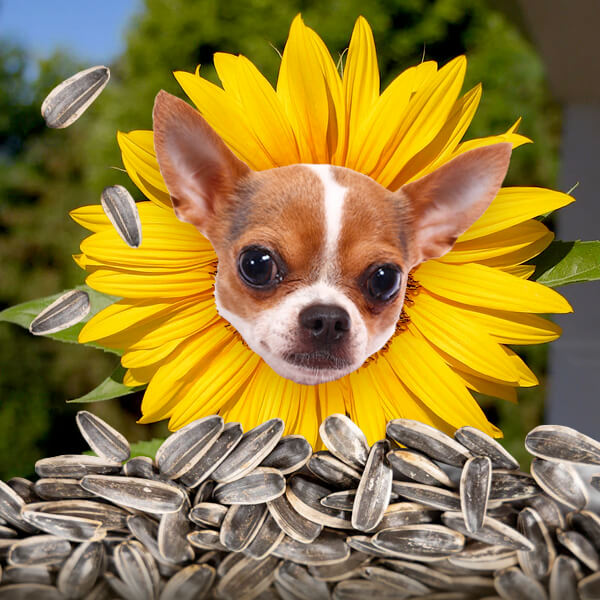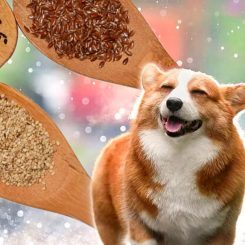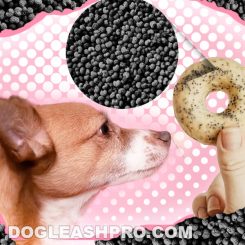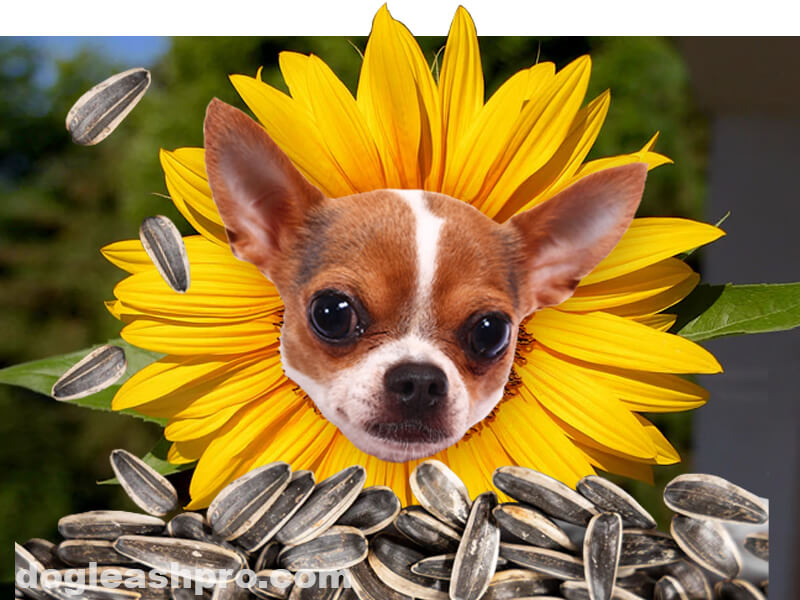
Sunflower seeds are popularly used in vegetable dishes like roasted Brussel Sprouts or in dairy products like yogurt. While I was making my vegetable dish yesterday, I accidentally spilled my bag of Sunflower seed kernels onto the floor. My Chihuahua will eat anything and she nibbled at the Sunflower seeds. I wasn’t sure if this seed was safe for dogs to eat and my curiosity led me to write this article.
Can dogs eat Sunflower seeds? Yes, dogs can eat Sunflower seeds in moderation. These seeds provide several health benefits to dogs, however, owners should properly prepare the seeds before feeding them to their pups. The shell should be peeled off and the seed kernels should be plain and unsalted. It’s best to crush them up and sprinkle them over the dog’s main meal.
Table of Contents
What are Sunflower seeds and can dogs eat them?
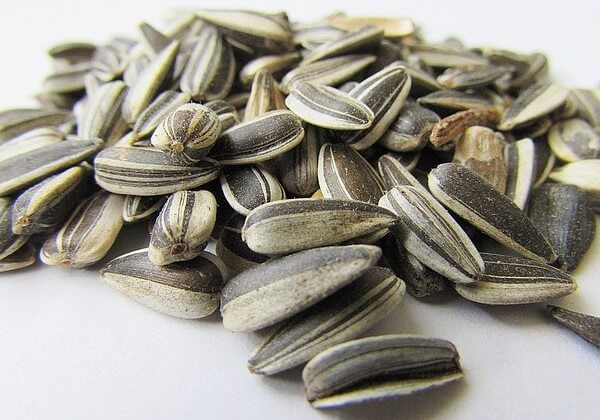
Dogs can definitely eat Sunflower seeds as they are packed full of vitamins, minerals, and healthy fatty acids. When dogs eat Sunflower seeds, they will receive these health benefits.
However, proper preparation of this seed before feeding it to your furry friends is crucial. The Sunflower seeds have a hard outer shell, which is not edible or safe for dogs. Be sure to peel off the shell first and only give the Sunflower seed kernels to your pooch.
Accidentally eating the shell of the Sunflower seeds can cause diarrhea and severe gastrointestinal distress in dogs.
Also, be sure that the seeds are plain with no added salt. If your four-legged friends ingest too much salt, they can have high blood pressure and we don’t want that.
So what are Sunflower seeds? The conical-shaped Sunflower seeds come from the middle portion of a herbaceous plant called sunflower or Helianthus annuus. You can find sunflowers all throughout the United States, especially in dry environments with open meadows, plains, and prairie lands. They can also be found in Central America, Northern Mexico, and Canada.
Sunflowers come in different sizes. Some are small while others are large. You’ll want to get your Sunflower seeds from the larger varieties of sunflower because those are the ones that are best for eating.
There are 3 common types of Sunflower seeds. The most common type is linoleic sunflower seeds. The other two are sunflower oil seeds and high oleic Sunflower seeds. These three varieties have their own levels of polyunsaturated, saturated, and monounsaturated fats.
Sunflower seeds are also distinguished by their shell or husk color. If the shell is completely black, then it would be a black oil sunflower seed. This type of Sunflower seed is not for eating, instead, they are pressed for oil extraction. The best type for eating is the striped shell Sunflower seeds, in which you will see black and white stripes on the shell.
What are the health benefits of Sunflower seeds for dogs?
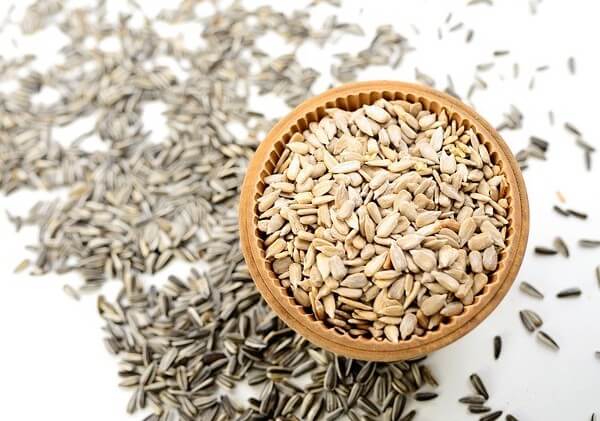
Plain Sunflower seeds or Sunflower seed kernels provide several health benefits to our furry family members. They are packed full of vitamins and nutritious.
However, they are a calorie-dense snack, which is why your pooch should only eat Sunflower seeds occasionally in moderation.
Since Sunflower seeds are high in calories, it’s best to keep the serving size to ¼ cup at a time.
Nutritional profile of Sunflower seeds (¼ cup or 33g of Sunflower seed kernels)
| Name, Unit | Amount |
| Calories, kcal | 193 |
| Protein, g | 7 |
| Total fat, g | 17 |
| Sodium, mg | 3 |
| Carbohydrate, g | 7 |
| Fiber, g | 3 |
| Sugars, g | 1 |
| Calcium, mg | 26 |
| Iron, mg | 2 |
| Vitamin A, µg | 1 |
| Vitamin B-6, mg | 1 |
| Vitamin C, mg | 1 |
| Vitamin E, mg | 12 |
| Folate, µg | 75 |
| beta-Carotene, µg | 10 |
| Magnesium, mg | 108 |
| Phosphorus, mg | 218 |
| Potassium, mg | 213 |
| Zinc, mg | 2 |
| Copper, mg | 1 |
| Manganese, mg | 1 |
| Selenium, µg | 18 |
| Thiamin, mg | 1 |
| Riboflavin, mg | 1 |
| Niacin, mg | 3 |
| Fatty acids, total monounsaturated, g | 6 |
| Fatty acids, total polyunsaturated, g | 8 |
| Tryptophan, g | 1 |
This means a ¼ cup or 33g of Sunflower seed kernels has about 193 calories, 17 grams of healthy fat and 7 grams of carbohydrate (1 grams of sugar).
As you can see, eating only a small portion of Sunflower seeds can increase your calorie and carbohydrate intake. This is why your pooch should only eat ¼ cup or less of the Sunflower seeds.
However, your pooch will receive 7g of protein, 3g of fiber, and 75µg of folate. From the nutritional profile for sunflower seeds, you’ll notice that the Sunflower seeds are packed full of minerals and vitamins such as Vitamin A, B, C, E as well as folate, magnesium, phosphorus, potassium, zinc, manganese, selenium, niacin, and riboflavin.
Let’s break it down and describe in details how these minerals and vitamins help our furry friends:
Vitamin E provides antioxidants to help strengthen a dog’s immune system
In ¼ cup of Sunflower seeds, there is 12 mg of Vitamin E. Our canine friends need Vitamin E daily as it is an antioxidant that helps boost their immune system and build muscle strength.
Additionally, your furry friends will receive these health benefits from Vitamin E:
- Vitamin E is an antioxidant that protects your dog’s body against free radicals in both the skin and other cells.
- This fat-soluble and essential vitamin improves the canine’s heart and liver health.
- Protect the nerve cell membranes.
- Create cell membranes.
- Manage cell respiration.
- Provides dogs with healthy fur and skin.
- Manage cholesterol levels.
- Crucial for metabolizing fat.
Fatty acids is key to good cholesterol, normal blood pressure, and healthy skin and hair in dogs
All dogs need these five essential fatty acids:
- Linoleic acid: Omega-6 fatty acids.
- Arachidonic acid: Omega-6 fatty acids.
- Eicosapentaenoic acid: Omega-3 fatty acids
- Docosahexaenoic acid: Omega-3 fatty acids
- Alpha-linolenic acid: Omega-3 fatty acids
Sunflower seeds contain linoleic acid, which is a type of unsaturated fat that helps to lower your dog’s high blood pressure. As a result, this omega-6 fatty acid helps to decrease the risk of stroke and heart disease in dogs.
Also, this healthy and good fat helps keep your dog’s cholesterol level balanced – improve the good cholesterol levels and lower the production of bad cholesterol.
Numerous studies have shown that dogs have healthy skin and coats after eating Sunflower seeds for some time. The essential fatty acids in these nutty seeds give your pooch a healthy, shiny, and full coat with soft skin.
Magnesium helps reduce anxiety, depression, and stress in dogs
Sunflower seeds contain 108 mg of magnesium, which is great for nervous dogs or dogs with anxiety. This essential mineral helps dogs to stay relaxed and calm.
Additionally, if your canine pooch is suffering from seizures, spasms, or muscle tension, feeding them some Sunflower seeds is helpful.
B vitamins are great for your dog’s health
Sunflower seeds are packed full of B vitamins.
The B-6 vitamin found in this seed helps dogs with the following:
- Activating genes.
- Niacin synthesis.
- Immune response.
- Regulating hormones.
- Nervous system function.
- Red blood cell function.
- Generating glucose.
Vitamin B-12 helps your furry friends with the following:
- Improve their intestinal and digestive health.
- Boost brain function.
- Proper growth and formation of blood cells.
Niacin is Vitamin B-3 reduces your pup’s anxiety level and neurosis and improves your canine friend’s brain activity. It also assists in the metabolism of proteins in dogs.
Tryptophan, an essential amino acid from Sunflower seeds, is especially good for dogs with low serotonin levels in their brain and the serotonin in this seed helps to reduce aggressive behavior and stress in dogs.
Sunflower seeds also contain thiamine, which assist in regulating both carbohydrate metabolism and energy in canines. It also activates the ion channels in your pup’s neural tissue.
Riboflavin is also known as B-2, which supports the metabolism of carbohydrates and amino acids in the dog’s body.
Pyridoxine or Vitamin B-6 improves bladder health in dogs and supports the metabolism of amino acids.
Fun Fact: Amaranth is a superfood that contains all nine essential amino acids and it also helps keep your furry friends’ gut healthy.
Are Sunflower seeds safe for dogs?
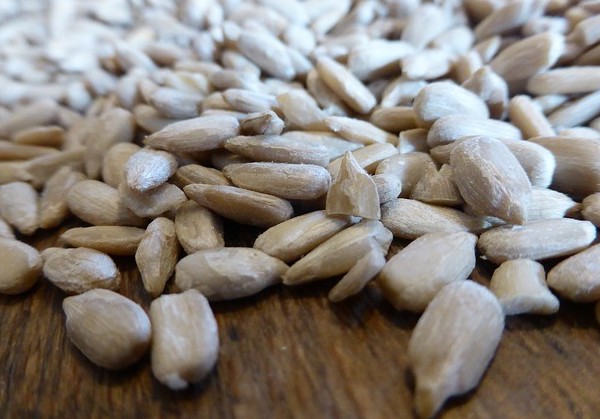
While Sunflower seeds provide many health benefits to your pooch, it’s important to note that dog owners should feed this seed to their pups in moderation. Before you give Sunflower seeds to your furry friends, make sure the shell is peeled off and the Sunflower seed kernel is not salted.
Dogs generally love Sunflower seeds because they have a nutty taste, but eating too much of them can make canines sick.
Here’s what you need to know.
Salted Sunflower seeds are harmful to dogs
The store-bought Sunflower seeds are usually coated with salt to satisfy the human palate. However, the high amount of salt in these Sunflower seeds are especially toxic to dogs. Ingesting too much salt can cause salt poisoning or sodium toxicosis in dogs.
Symptoms of sodium toxicosis in dogs includes:
- Extreme thirst leading to frequent urination.
- Diarrhea.
- Vomiting.
Sunflower seed shells can give dogs gastrointestinal distress
The shell of the Sunflower seeds is very harmful to dogs since it is inedible. Dogs that accidentally get a hold of a Sunflower seed that is still covered in the shell will not be able to chew it properly.
The shell can be a choking hazard if your furry friends accidentally swallow it without chewing it properly. The open shell may have sharp edges that can scratch your dog’s throat and esophagus and cause internal bleeding.
Additionally, when the Sunflower seed shells enter the stomach, they can cause a stomachache or get stuck in the gastrointestinal tract and cause internal bleeding or blockage. All of these situations can harm your dog’s life and health.
Excessive amount of Sunflower seeds is very dangerous to dogs
Sunflower seeds contain oil and when dogs eat too many Sunflower seeds, then they are ingesting excessive amounts of oil from these seeds.
Your dog’s digestive system will have a hard time breaking down the fats and as a result, your pooch may have diarrhea. Avoid giving your puppy or small dogs too many Sunflower seeds because doing so may put them at risk of pancreatitis or inflammation of their pancreas.
If you accidentally feed your pooch too many Sunflower seeds or your four-legged friends eat too many Sunflower seeds, it’s best to bring them to the veterinarian immediately.
Handy Hint: Since dogs have a difficult time digesting fats, it’s important that owners do not feed them fatty food like Chicken Skin, which is high in calories and fat and provides no nutritional value to dogs.
How many Sunflower seeds to give your dog?
If you decide to feed your furry friends some Sunflower seeds, it’s important to be mindful of how much Sunflower seeds you’re giving them.
As you can see from the nutritional profile table above, ¼ cup of plain, unsalted Sunflower seeds contain 193 calories. With that, we recommend only giving your small pooch 10 to 15 seeds and your large canine friends only 20 to 35 seeds a week.
We highly recommend that dog owners do not go over this amount. You can crush the sunflower seeds into small pieces and sprinkle them over their regular dog food. Alternatively, you can add them to the homemade dog treats.
So, can dogs eat Sunflower seeds?
Your furry family member can definitely eat Sunflower seeds, but moderation is key. Giving your pooch too many Sunflower seeds can cause a series of health problems in dogs.
A moderate amount of Sunflower seeds should suffice and will provide tons of health benefits to your pooch because they are packed full of minerals and vitamins.
Remember to peel the shell off first and make sure the Sunflower seeds are plain with no added salt.
DISCLAIMER: THIS WEBSITE DOES NOT PROVIDE MEDICAL ADVICE
The information, including but not limited to, text, graphics, images and other material contained on this website are for informational purposes only. No material on this site is intended to be a substitute for professional veterinary advice, diagnosis, or treatment. Always seek the advice of your veterinarian or other qualified health care provider with any questions you may have regarding dietary needs.
Resources:
https://www.ncbi.nlm.nih.gov/pmc/articles/PMC5976617/
https://fsi.colostate.edu/sunflower-seeds-draft/

With over five years of specialized experience as an animal writer, my expertise lies in dog nutrition, health, behavior, grooming, and training. I am dedicated to delivering helpful and informative content that caters to the well-being of our furry friends. My primary goal is to empower pet owners with knowledge and ensure our canine companions thrive in health and happiness. In my free time, I love volunteering at local dog rescue centers.
